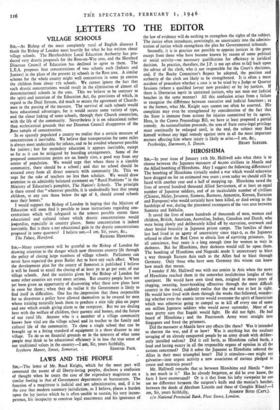LAWS AND THE PEOPLE
SIR,—The letter of Mr. Road Knight, which for the most part will command the assent of all liberty-loving peoples, discloses a confusion of thought when he treats the case of the stipendiary magistrate on a similar footing to that of Government departments or bureaucrats. The function of a magistrate is judicial and not administrative, and, if it be the case that modern summary jurisdiction, as I believe, places a burden upon the lay justice which he is often unable to sustain, his very incom- petence, his incapacity to construe legal enactments and his ignorance of
the law of evidence will do nothing to strengthen the rights of the subject. The justice often introduces, unwittingly, an uncertainty into the adminis- tration of justice which strengthens the plea for Governmental tribunals.
Secondly, it is in practice not possible to appoint justices in the gross except from those who have become known by reason of some political or social activity—no necessary qualification for efficiency in juridical decision. In practice, therefore, the J.P. is too apt often to fall back upon the advice of the clerk, who is not responsible for the Court's decisions, and, if the Roche Committee's Report be adopted, the position and authority of the clerk are likely to be strengthened. It is often a mere accident of procedure whether a case is to be tried by a Judge or Quarter Sessions (where a qualified lawyer now presides) or by lay justices. If there is libertarian merit in untrained justices, why not man our judicial benches in the same manner? All this confusion arises from a failure to recognise the difference between executive and judicial functions ; as to the former, what Mr. Knight says cannot too often be asserted. His' complaint may even be strengthened by consideration of the fact that the State is immune from actions for injuries committed by its agents. Here, in the Crown Proceedings Bill, we have at least proposed a partial remedy. As nationalisation proceeds, the area of State extra-legal privilege must continually be enlarged until, in the end, the subject may find himself without any legal remedy against torts in all the most important matters affecting him where injury is likely to arise.—I am, &c.,
Postbridge, Dartmoor, S. Devon. HENRY SLESSER.


























 Previous page
Previous page